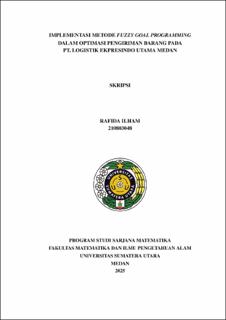Implementasi Metode Fuzzy Goal Programming dalam Optimasi Pengiriman Barang pada PT. Logistik Ekspresindo Utama Medan
Implementation of the Fuzzy Goal Programming Method for the Optimization of Goods Delivery at PT. Logistik Ekpresindo Utama Medan

Date
2025Author
Ilham, Rafida
Advisor(s)
Syahputra, Muhammad Romi
Gio, Prana Ugiana
Metadata
Show full item recordAbstract
PT. Logistik Ekspresindo Utama is a freight forwarding company that faces signi f icant challenges in distribution efficiency, particularly due to frequent delivery delays and unfulfilled customer demand resulting from manually and subjectively determined delivery routes. Inefficient route planning directly contributes to increased operational costs, longer delivery times, and reduced delivery reliability. This study aims to design a distribution optimization solution using the Fuzzy Goal Programming (FGP) approach, a mathematical programming method capable of addressing multi-criteria decision making problems simultaneously. The model is formulated as a multi-objective linear programming problem and solved using the Fuzzy Goal Programming (FGP) approach based on the Weights Method, with the assistance of MATLAB software. The data used in this study are secondary data from actual delivery routes in North Sumatra and Aceh. The model’s objectives include minimizing total distance, travel time, and distribution cost, while simultaneously maximizing customer demand fulfillment. The optimization results indicate that although the total distance, time, and cost are slightly higher than those in the company’s current system (increasing from 4,626 km to 5,030 km; from 115.63 hours to 125.75 hours and from Rp7,007,700 to Rp7,513,900), the proposed model successfully fulfills 27,000 kg of customer demand. This represents a signi f icant improvement over the company’s current practice, which only meets 23,500 kg of demand. These findings demonstrate that the FGP approach effectively resolves issues of late deliveries and unmet demand, producing more adaptive and realistic distribution route configurations. Therefore, FGP can serve as a reliable and systematic decision making tool for improving the efficiency and responsiveness of logistics distribution systems
Collections
- Undergraduate Theses [1496]
